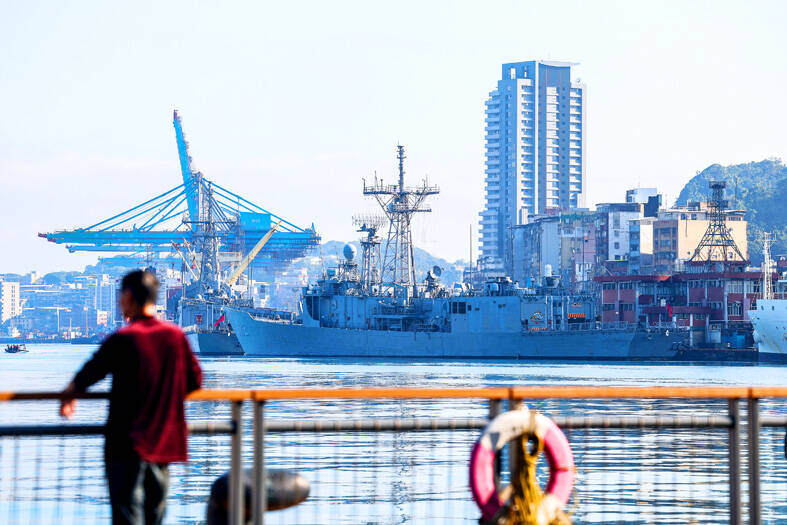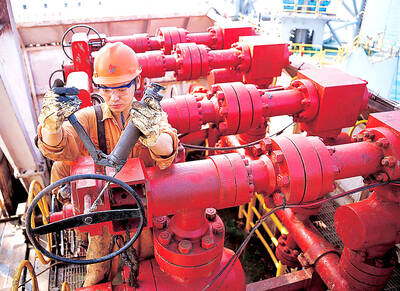Beijing’s recent naval exercises have left Taiwan and the US “struggling” for a response as the two nations drew different conclusions about the implications of the Chinese military drills, the Financial Times (FT) reported on Sunday.
Taiwan has been bracing for China to hold military drills to retaliate against President William Lai’s (賴清德) diplomatic visits abroad, the outlet said, referring to Lai’s Nov. 30 to Dec. 6 tour to Taiwan’s three South Pacific allies, which included stopovers in Hawaii and Guam.
Beijing announced partial air traffic restrictions across seven time zones along its coast from Shanghai to Hong Kong over two days.

Photo: I-hwa Cheng, AFP
Yet, the Chinese People’s Liberation Army (PLA) has issued no statement about the drills, in a major departure from its practice of launching propaganda campaigns to accompany military exercises targeting Taiwan, the FT said.
Taipei and Washington have drawn “drastically different conclusions” about the meaning of Beijing’s latest military activities, it said.
On Monday last week, the Ministry of National Defense established an emergency response center, saying that “no matter if they have announced drills, the level of the threat to us is severe.”
In contrast, the US said that the Chinese military activity in the region was “elevated” in a continuation of the broader trend of the past several years and “consistent” with levels observed in recent exercises.
The newspaper cited US officials as saying that they do not see the drills as a response to Lai’s short visits to Hawaii and Guam.
The FT quoted a senior US official as emphasizing the importance of distinguishing a coercion campaign targeting a transit from the type of “routine large regional exercise” that appears to have occurred.
“They made a choice not to execute a pressure campaign in response to the Lai transit,” the official said, adding that China might have decided to not specifically respond to Lai’s transit because it was “low profile.”
Taiwan might have become more alarmed because its ability to detect and track Chinese military activities has improved, the senior official said.
Washington has not asked Taipei to dial back the rhetoric in recognition that Taiwan might have domestic political considerations, they added.
It was possible that Beijing did not want to spark tensions during the US presidential transition or avoid calling attention to the military amid the conduct of anti-corruption probes into the PLA, the FT said.
The divergent messaging is a sign of the difficulties for Taiwan, the US and allies to assess Beijing’s intentions and mount a response against China’s use of its rising military strength in a “creeping pressure campaign” against multiple neighbors, the newspaper said.
China’s combination of traditional and unannounced drills could be a deliberate tactic to “sow confusion and uncertainty” among its foes, it cited observers as saying.
Regularly conducting large-scale exercises could help making preparations to attack Taiwan harder to detect, it added.
Speaking on the condition of anonymity, a Japanese official told the FT that China has crossed some new line in each of its previous exercises.
“Now they have created another new normal: That they can do maneuvers of this size without announcement, leaving all of us struggling to respond,” they said.

The Chinese military has built landing bridge ships designed to expand its amphibious options for a potential assault on Taiwan, but their combat effectiveness is limited due to their high vulnerability, a defense expert said in an analysis published on Monday. Shen Ming-shih (沈明室), a research fellow at the Institute for National Defense and Security Research, said that the deployment of such vessels as part of the Chinese People’s Liberation Army (PLA) Navy’s East Sea Fleet signals a strong focus on Taiwan. However, the ships are highly vulnerable to precision strikes, which means they could be destroyed before they achieve their intended

About 4.2 million tourist arrivals were recorded in the first half of this year, a 10 percent increase from the same period last year, the Tourism Administration said yesterday. The growth continues to be consistent, with the fourth quarter of this year expected to be the peak in Taiwan, the agency said, adding that it plans to promote Taiwan overseas via partnerships and major events. From January to June, 9.14 million international departures were recorded from Taiwan, an 11 percent increase from the same period last year, with 3.3 million headed for Japan, 1.52 million for China and 832,962 to South Korea,

SOVEREIGNTY: The rigs show that Beijing ‘rejects Taiwan’s jurisdiction’ by building in areas where Taipei demands permission to build or alter installations Chinese oil rigs have been sighted just 26 nautical miles (42km), from Taiwan’s exclusive economic zone (EEZ) near Pratas Island (Dongsha Island, 東沙島), posing a threat to Taiwan’s sovereignty if left unchallenged, a brief published by the Jamestown Foundation on Tuesday said. Pratas Island, 444km from Kaohsiung, is northeast of the South China Sea and houses a Taiwanese garrison. The brief, titled “Rigging the Game: PRC Oil Structures Encroach on Taiwan’s Pratas Island” — referring to the People’s Republic of China — analyzed photographs and said that Beijing’s tools to pressure Taiwan now include oil rigs. “Oil rigs now constitute part of Beijing’s

The Taiwan Experience Education Program (TEEP) has funded short-term internships in Taiwan for more than 4,500 young people from more than 40 countries since 2015, with the goal of attracting and retaining international talent, the Ministry of Education said yesterday. Fifty-five colleges launched 514 projects this year, including in fields such as semiconductors, artificial intelligence, medicine and biotechnology, green energy, and sustainability, it said. The program provides research and practical internships in Taiwan for two to six months, and offers cultural exchange and networking opportunities, the ministry said. For example, National Formosa University’s Embedded System and Autopilot Laboratory developed two solar-powered drones in